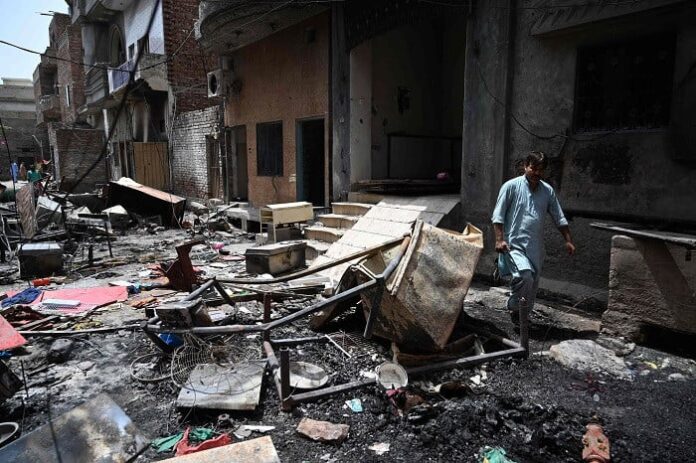Islamabad: A year has passed since 20 churches and more than 80 houses of Christians in Pakistan’s Punjab Province were vandalised and destroyed by a mob over false blasphemy allegations but justice is yet to be delivered to the minority community, according to Amnesty International.
The global human rights watchdog said the Pakistan government has “failed” to deliver justice to the minority Christian community as well as prevent further misuse of blashphemy laws.
“On August 16, 2023, allegations of blasphemy (that have since been proven false) against two Christian residents of Jaranwala in Faisalabad district of Punjab province of Pakistan, led to a mob vandalizing and destroying over 20 churches and more than 80 Christian houses,” the Amnesty recalled.
More than 90% of the suspects of the attack in Jaranwala are still at large, according to information obtained by Amnesty International through a Right to Information Request filed at the Faisalabad City Police Office.
Meanwhile, the trials of those arrested in connection with the attacks, triggered by false allegations of blasphemy against two Christian residents, are yet to start, Amnesty said in a statement.
In addition, around 40% of the minority Christian families affected by the violence are still awaiting government compensation, it added.
“Despite the authorities’ assurances of accountability, the grossly inadequate action has allowed a climate of impunity for the perpetrators of the Jaranwala violence,” said Babu Ram Pant, Amnesty International’s Deputy Regional Director for South Asia.
“A year on, the minority Christian community are being forced to reconcile with the fact that their aggressors continue to live amongst them without repercussions. Pakistan government must ensure that justice is delivered and minority groups are protected against discrimination and violence,” he said.
“The violence and the inadequate response by the authorities has left Christians in Jaranwala living in fear as they face continued threats and marginalization,” said the Amnesty statement.
“Many have lost their jobs due to heightened tensions that have also affected businesses and public life in the city,” it said.
Frightened Christian families continue to face threats from perpetrators of the violence who were released over the last year.
Seeking a sense of security, some Christian families have migrated to neighbouring cities.
Religious leaders who incited the mob still roam free and continue to exercise influence in the area.
While the government repaired destroyed churches, many Christian residents of Jaranwala are still awaiting compensation.
“… we saw our houses in complete shambles, like the building would soon collapse. And to date, we have received no support. It has been a year, my husband is unemployed, because no one hires him (due to stigma). Many people received the promised compensation of 2 million rupees (US$7,200), but we did not receive it,” said Khalida Bano, a Christian woman from Jaranwala said.
As per data from the Supreme Court submission dated February 7, 2024, the government has provided compensation to only 85 families, as opposed to the 146 families mapped by the local parish.
Samuel Payara, the lead petitioner for the Christian community in cases related to the Jaranwala attacks at the Supreme Court, described a culture of impunity for violence against religious minorities.
“Despite the police accusing thousands for the mob violence, only about 400 were arrested. Of those, most roam free. Even more alarming is that the individual who incited the mob using a mosque’s loudspeaker has also been granted bail, and some groups are harassing victims to prevent them from participating in the cases [as witnesses].”
Information received by Amnesty International on 3 August 2024 through a Right to Information Request filed at the City Police Office Faisalabad, indicates that of the 5,213 accused, 380 were arrested with 4,833 still at large.
Of those arrested, 228 are now out on bail granted by the Anti-Terrorism Court in Faisalabad and 77 had the charges against them dropped.
There appears to be a double standard in the way the legal system responds to such incidents.
While trials against those accused of the mob violence in Jaranwala have not started, a 27-year-old Christian man was sentenced to death in July 2024 by an anti-terrorism court for causing the riots in Jaranwala through an allegedly blasphemous video on TikTok.
He was charged under sections 295-C and 295-A of the Pakistan Penal Code which deals with blasphemy, section 11 of the Prevention of Electronic Crimes Act and Section 7(1)(g) of the Anti-Terrorism Act.
Calling the state’s failure to deliver justice as ‘judicial apartheid’, President and Moderator of the Church of Pakistan, Bishop Azad Marshall, said: “Things have deteriorated since Jaranwala … You cannot just displace people one day and expect that by replacing their things or repairing buildings, you will make them feel safe and comfortable again.”
As accusations of blasphemy continue to upend lives across the country, the minority Christian community are finding it difficult to pick up their lives and move on.
Tariq Bashir, a Christian resident in Jaranwala, said: “The mental anguish of the Jaranwala incident is such that even today, a year later, our children start trembling when someone mentions it in front of them.”
Less than a year after the Jaranwala incident, in May 2024, a Christian man was lynched and his factory set ablaze in Sargodha, Punjab, on allegations that he had burnt pages of the Quran.
In June 2024, a 36-year-old Muslim man was burnt to death by a mob in Swat, Khyber Pakhtunkhwa, due to similar allegations.
“Time and again, incidents of mob violence, fueled by regressive blasphemy laws and lack of accountability, continue to destroy the lives of minority communities living in Pakistan. Continued impunity not only leaves victims of the violence in limbo, but it does also very little to prevent future attacks from taking place,” said Babu Ram Pant.
“The authorities in Pakistan must complete a thorough, impartial and independent investigation into the Jaranwala attacks and other incidents of mob violence and ensure that those responsible are prosecuted in fair and transparent trials, without resorting to the death penalty.
“Blasphemy laws must be repealed without further delays. It is high time that Pakistan does away with this legalized system of discrimination and violence to create safe spaces for minorities in the country,” said Babu Ram Pant.








